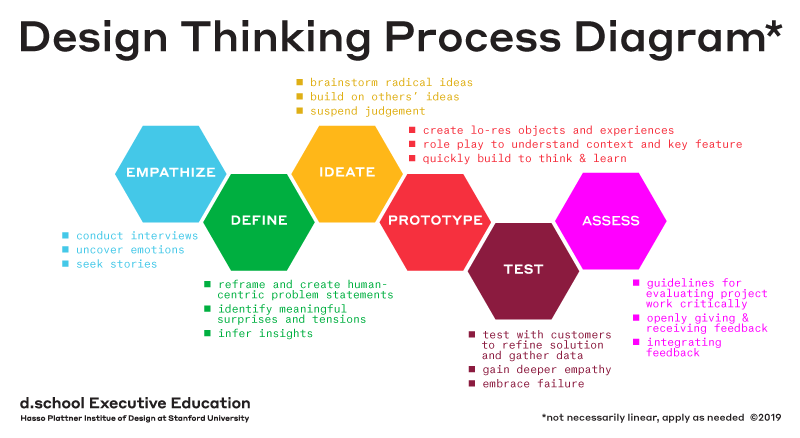The Hard and Soft Digital Marketing Skills of Rockstar Marketers
If you want a wildly successful career in digital marketing, these are the digital marketing skills you need. We cover both hard and soft skills as well as why every marketer needs to learn Design Thinking.

Of all the marketing jobs, digital marketing demands the broadest variety of skills. You have to be part artist, part scientist, part mathematician—and sometimes part magician—to succeed in a digital marketing career.
You only have to read a few job descriptions to realize that this field requires a potpourri of digital marketing skills. Here, for example, are just a few skills from a single digital marketing job description template:
- Digital data analysis
- Email preparation
- Coordination with the sales team
- Use video and picture editing software
- Problem-solving
And that’s just a snapshot of a typical digital marketing job description! Makes you wonder if employers are looking for a real person … or a unicorn. 🦄

Gain digital marketing skills through free online courses, tasks, and apprenticeships on Acadium.
The reality is, digital marketing demands a wide range of both hard and soft skills. That’s why a digital marketing career isn’t for everyone. For example, you can’t just be good with words; you have to have a head for numbers, too.
But if you’re truly interested in digital marketing and you’re committed to a lifetime of learning, then you can definitely make it!
What skills should a digital marketer have?
As you launch your career in digital marketing, you may be wondering what skills you must develop and sharpen to become the proverbial unicorn job candidate. That’s exactly what you’ll learn in this article.
It’s going to be a long list, but don’t let that overwhelm you. Yes, you’re expected to be comfortable with the different domains of digital marketing. But you need to be an expert in only one domain. This is what’s called a T-shaped marketer: someone who has a broad knowledge of several marketing domains, but deep expertise in one specific area. In this sense, a successful digital marketer is both a generalist and a specialist.
As you gain more experience in digital marketing, you’ll discover which particular domain meets the following two criteria: (1) you have an aptitude for it; and, (2) you enjoy it. When you find your sweet spot, that’s the specific domain you should cultivate as your area of expertise.
To better understand digital marketing skills, we’ll first go through hard digital marketing skills then move on to soft skills.
What are hard skills in digital marketing?

Digital marketing requires a combination of diverse and challenging skills.
A hard skill is an ability that’s easily observed and measured. Anyone can see whether or not you can perform a hard skill.
Some hard skills are necessary for all digital marketers, regardless of which specific job you’re in. These skills can be considered “table stakes” or the minimum skills you need to compete in the digital marketing world.
These essential hard skills include:
1. Writing
Every piece of content on the web and on digital applications begins with the written word. This includes video and audio content such as podcasts. That’s why, if you want to become a digital marketer, you must have good writing skills.
Fortunately, “good writing” doesn’t mean you have to be the next Jon Morrow or Stephen King. It does mean being able to convey ideas clearly. You don’t even need to remember all the grammar rules and correct spellings—there are apps such as Grammarly to help you with that!
Depending on which digital platform you want to specialize in, you have to strengthen specific types of writing, such as blogging, writing social media posts, or email writing.
2. Copywriting
Copywriting is a specific type of writing with the intention of persuading people to take action. This action can be anything from signing up for a newsletter to clicking an ad to buying a product.
Even if you don’t want to go into paid advertising, you still need to have copywriting skills. That’s because as a digital marketer, you’re always trying to get your audience to perform actions leading up to the sale. You also have to reach out to potential partners for collaborations. You need copywriting skills to achieve all this.
Copywriting is applied to all aspects of marketing in sales. It’s so essential that some people build their entire careers in copywriting.
3. Marketing analytics and data analysis
Digital marketing, unlike traditional marketing, is extremely measurable. It’s hard to measure the impact of a billboard: How many people saw it? And how many people purchased a product as a result of seeing a billboard? It’s impossible to tell!
But in digital marketing, it’s much easier to measure both reach and conversion, thanks to marketing analytics. For example, here at Acadium, we know how many people are reading the blog post that you’re reading now. And we know how many of you will sign up for an Acadium account from this post. The numbers are perfect, but they’re directionally accurate.
This makes it much easier for digital marketers to measure their progress and success. It also means digital marketers need to be comfortable with numbers. You don’t have to be a math whiz. You do have to know how to understand a spreadsheet, make sense out of the numbers, and adjust your marketing strategies, tactics, and activities accordingly.
4. Search engine optimization (SEO)
Your writing skills are for naught if your content isn’t discoverable by your audience. And the primary way people find content is through search engines, with Google and YouTube being the biggest ones. SEO involves both on-page and off-page optimization of your content. It applies to written content (such as blog posts) as well as podcasts and videos. Each platform has its own SEO nuances, but the general strategies are similar.
Also Read: How to Become an SEO Specialist: Complete Guide + Tools
Other hard skills in digital marketing are domain-specific. Some are even platform-specific.
You’ll only need these hard skills for specific digital marketing roles:
1. Google ads
Google advertising can be lucrative—but only if you know what you’re doing. If not, it can be the biggest waste of advertising dollars. Google ads skills include keyword research, copywriting, setting up and managing Google Ads campaigns, data analysis, and budget management. Google offers free training and certification in Google ads.
2. Social media ads
Social media platforms also have paid advertising. Different businesses place ads on different social media, depending on where their target audience is hanging out. And so, you may find yourself needing skills in YouTube ads, Facebook ads, Instagram ads, and so on.
3. Organic social media skills
These skills encompass the use of social media to attract and convert an audience organically or without paid ads. These include:
- Writing posts in an engaging way
- Creating images and/or videos
- Brainstorming story angles, topics, and campaigns
- Customer service skills to respond to your audience
- Data analysis
You’ll apply these skills in a nuanced way, depending on the specific social media platforms you use.
Also Read: How to Become a Social Media Manager: Skills, Salary, & Tools
4. Video production

Video production is another important digital marketing skill to have. (Photo by NeONBRAND)
Video has become the medium of choice for internet users. In a survey of 694 marketers and small business owners, Biteable found that:
- 60% of businesses use video for marketing purposes; 32% of businesses use video for sales
- 61% of marketers who use video say it’s a “very important or extremely important” component of their marketing strategy
- 74% of video marketers say video has a better ROI than static images; 68% say video has a better ROI than Google ads
“Most people are more than happy to be marketed to with video,” Biteable says. But because video entails more time, skills, and money to produce, not all marketers are able to use it.
This means video marketing is still a blue ocean of opportunity for digital marketers. Learn how to produce videos for different platforms—Facebook and YouTube are the most popular, followed by Instagram, Twitter, and TikTok—and you’ll be ahead of the competition.
5. WordPress
WordPress is the most popular content management system today. As of this writing, 43% of all websites are built on WordPress. More than 500 websites are built every day using WordPress.
If you’re a content creator or manager for a WordPress site, you’ll most likely need to know how to draft, format, and schedule content on WordPress. You’ll also need to be familiar with the most popular WordPress plugins, such as SEO Yoast. Some businesses also use third-party WordPress page builders Beaver Builder, Divi, Elementor, and Thrive Architect.
What are the soft skills for digital marketing?
Soft skills refer to attributes and traits that help you get along and collaborate effectively with others. Some soft skills may be considered personality traits, and some come more naturally to you than others. But as with hard skills, soft skills can be learned and developed.
To succeed in digital marketing, you will need not just hard skills but soft skills as well. The majority of employers believe that soft skills are the most important skills for employees to learn. “Talent developers, executives, and people managers agree that training for soft skills is the top priority for talent development teams,” a LinkedIn survey found.
And the easiest way to gain soft skills is by learning design thinking.
“When employees go through a design thinking training program, it’s basically a crash course in all the soft skills they need to succeed.”
ExperiencePoint
Design Thinking is a problem-solving methodology developed at the Hasso-Plattner Institute of Design at Stanford (d.school). It has five components:

Learning design thinking helps you gain the soft skills you need to succeed. (Image Source)
1. Empathize
Have an empathic understanding of the problem you’re trying to solve. This requires skills in empathy, listening, observing, and engaging.
2. Define the problem
Use the information you have to create a human-centered problem statement. The skills you need at this stage are analysis, synthesis, critical thinking, and communication.
3. Ideate
Ideation means generating ideas to come up with solutions for the problem you’ve just defined. This step requires creativity and out-of-the-box thinking.
4. Prototype
In this stage, you develop a prototype or minimum viable version of the solutions you brainstormed previously. The idea is to test each solution quickly. This stage requires soft skills like teamwork, curiosity, and adaptability.
5. Testing
This stage involves gathering feedback and refining solutions. It requires leadership, empathy, adaptability, honesty, and objectivity. You also need self-management skills or the ability to stay optimistic and to manage your energy and productivity—especially when testing results say you have to go back to the drawing board.
“Prototype as if you know you’re right, but test as if you know you’re wrong.”
d.school at Stanford University
As you can see, learning Design Thinking builds the following soft skills you need in digital marketing:
- Empathy
- Listening
- Observing
- Engaging
- Analysis
- Synthesis
- Critical thinking
- Communication
- Creativity
- Out-of-the-box thinking
- Teamwork
- Curiosity
- Adaptability
- Leadership
- Honesty
- Objectivity
- Self-management
… and you become an outstanding problem solver to boot!
3 ways Acadium can help you acquire digital marketing skills
Now that you know which skills you need to become a successful digital marketer, the next question is: How do you gain these skills?
We at Acadium can help you acquire all these skills—for free—in three ways:
1. Free digital marketing courses
Take our free digital marketing courses to get a foundational knowledge of digital marketing and its domains. You’ll find courses in everything from content marketing to SEO to marketing analytics and everything in between. Sign up here to get started.
2. Tasks
Go from theory to practice by completing a few marketing tasks on Acadium. These tasks have been requested by real-life business owners. Each one takes only 2 to 5 hours to finish. After you submit the task, the business owner will give you feedback and a star rating on your work. Use this feedback to sharpen your skills. You also have the choice to display your best work on your Acadium profile to showcase your digital marketing skills. Check out marketing tasks you can complete today.
3. Marketing apprenticeships
To gain digital marketing skills that make you more employable, complete an apprenticeship with a mentor. Working hands-on in a real business gives you more in-depth knowledge and experience you can leverage to find your first—or next—marketing job. Fun Fact: Half of the Acadium mentors we surveyed hired their apprentices after the apprenticeship. Get in the Acadium marketplace to find an apprenticeship.
Editor’s Note: This article was originally published in September 2021. It was updated in March 2022 for freshness and accuracy by Alisha Sharma, Content Manager at Acadium.
Lexi Rodrigo is the former Content Manager at Acadium. As a marketing and communications professional and course creator, she helps remarkable brands get seen, heard, and known. She has been a digital marketer and copywriter since 2008. She's also the co-author of "Blog Post Ideas: 21 Proven Ways to Create Compelling Content and Kiss Writer's Block Goodbye." When she's not reading or writing, Lexi bakes bread, grows food, and takes long walks. Connect with Lexi on LinkedIn.
-
Career Prep
Top Marketing Webinars for Digital Marketers in 2025
By attending these webinars, you will have the opportunity to learn from industry leaders, gain insider knowledge, and stay ahead of the competition.
-
Career Prep, News
9 Types of Digital Marketing to Choose From in 2025
Digital marketing is a dynamic field that offers diverse career opportunities. From search engine optimization to social media marketing, there are many specializations to explore. Whether you're just starting out or looking to switch careers, this guide will help you find your ideal digital marketing niche.

Subscribe to our newsletter for digital marketing resources
Become a better marketer with our digital marketing resources and tips shared weekly in your inbox.

Get started with Acadium
Build your marketing career for free or find marketing talent on any budget — fully remote.

